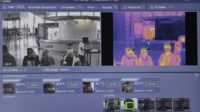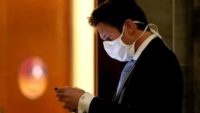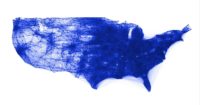With at least two million jobs lost across Canada due to the COVID-19 pandemic and the economy officially in recession, more stimulus is expected from the federal government to get the economy moving again. To date, the government has spent more than $145 billion on direct support for Canadians related to COVID-19. Beyond what has already been pledged for stimulus, experts say additional investments in infrastructure, especially related to clean technology, are one of the best ways to get people back to work and to leave a lasting legacy. Read full story here:…
Read MoreNew Normal: Are Canadians Ready To Go Cashless After Coronavirus? | CTV News
TORONTO — As the pandemic loomed, Lillian Elliott and her partner Sheryl Davies headed to the ATM to stock up on a bit of cash. They haven’t touched it since. The residents of Montague, P.E.I. had made it a habit of budgeting using cash in envelopes but since fears of transmission of COVID-19 has given widespread pause to handling bills and coins, the two have entirely shifted to using a credit card for expenses. “I just don’t want to be touching money right now,” says Elliott, but she can’t foresee…
Read MoreCOVID-19 Could Set A New Norm For Surveillance And Privacy | CNET
App developers are creating tools to monitor people when they shop and work, despite lacking proof that it works or has safeguards to protect your data. The COVID-19 pandemic has changed the way people interact and fostered more concern over our health. But that shift in mindset means daily activities like going grocery shopping or simple acts like standing in an elevator will come with even more surveillance strings attached. The response by governments and the tech industry to the coronavirus outbreak has already raised many concerns about privacy from…
Read MoreWhat Is Contact Tracing? Here’s What You Need To Know About How It Could Affect Your Privacy | CBC News
For weeks, Canadians have been hearing public health officials talk about the importance of testing and tracing: Test to know who has COVID-19; trace to know who might be infected so you can test them, too. There have been significant efforts on both fronts to improve capacity. And part of that effort has taken contact tracing into the digital age. What does that involve and what does it mean for your privacy? Read full story here: What Is Contact Tracing? Here’s What You Need To Know About How It Could…
Read MoreLiberals Hasten High-Speed Broadband Access Plan In Response To Pandemic | CBC News
As more Canadians find themselves living online while stuck at home during the COVID-19 pandemic, the Liberal government is accelerating its strategy to increase high-speed broadband coverage in rural Canada. A spokesperson for Rural Economic Development Minister Maryam Monsef said the government is consulting with telecommunication providers, rural municipalities and others about how best to move up plans to improve access to high-speed Internet in rural and remote communities. “The current crisis has reinforced the fact that high-speed Internet access is no longer a luxury,” said Marie-Pier Baril in a…
Read MoreCOVID-19: What Is Digital Contact Tracing And Is Canada Using It? | CTV News
TORONTO — Canadian officials are turning their attention to digital contact tracing to prevent the spread of coronavirus, a strategy experts warn may come with significant privacy concerns. Officials in Newfoundland and Labrador are the latest in Canada to suggest the use of voluntary contact tracing apps that would use cellphone data to monitor people’s movements and warn them of any contact with COVID-19 positive patients, eliminating an arduous task usually performed manually by public health departments. Citing examples from Singapore and South Korea — two countries actively engaged in…
Read MoreOil Prices Dip Into Negative Territory As Market Crashes | Roadshow
The US oil market witnessed history as the price dived under $0 a barrel for the first time as the coronavirus pandemic bites. US oil prices crashed below $0 a barrel on Monday and spiraled into negative territory for the first time ever. In a historic crash, oil futures opened at their lowest level since 1983. With hundreds of millions of people around the world staying at home to stop the spread of COVID-19, travel by car or plane is nearly nonexistent. Factor in a major lag in manufacturing and…
Read MoreACLU Outlines Privacy Concerns For Contact Tracing Tech | Engadget
As Google and Apple prepare to team up on surveillance tech to help track the spread of Covid-19, privacy watchdogs at the American Civil Liberties Union (ACLU) are urging the government and tech companies to take a tougher stance on privacy. The ACLU published a lengthy white paper outlining privacy concerns they say need to be taken into account in order for contact tracing tech to be effective. Apple and Google’s proposal would use bluetooth data to detect phone owners’ potential exposure to people who have tested positive for Covid-19.…
Read MoreApple And Google Are Building Coronavirus Tracking Tech Into iOS And Android | CNET
The two companies are working together, representing most of the phones used around the world. Two of the tech industry’s biggest players are working together to fight the coronavirus, announcing a new set of tools that could come to a majority of smartphones around the world. The new technology, outlined in white papers published by Apple and Google Friday, relies on Bluetooth wireless radio technology to help phones communicate with one another, ultimately warning people about people they’d come in contact with who are infected with the coronavirus. Apple and Google plan to…
Read MoreFacebook Begins Sharing More Location Data With COVID-19 Researchers And Asks Users To Self-Report Symptoms | The Verge
The company’s Data for Good program is expanding. Facebook is expanding a program that grants researchers access to data about movement patterns in an effort to help improve our understanding of the spread of COVID-19, the company said today. Data for Good, which uses aggregated, anonymized data from Facebook’s apps to inform academic research, will now grant access to three new maps for forecasting the disease’s spread and revealing whether residents of a given region are staying at home. The company will also prompt Facebook users to participate in a…
Read More








